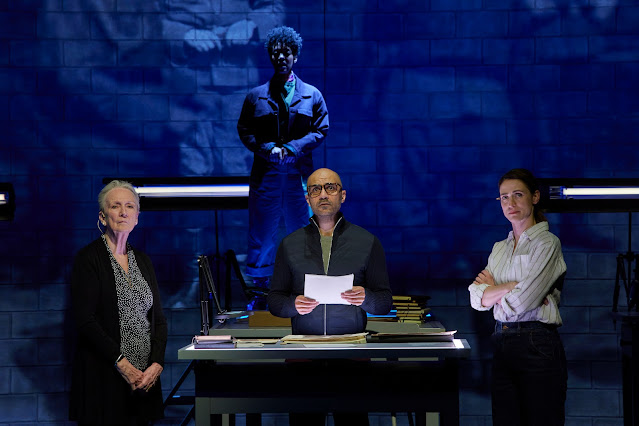Here There Are Blueberries, Shakespeare Theatre Company
The Tectonic Theater Project has returned to DC with its latest work, Here There are Blueberries, currently running at Harman Hall. It feels right that it should play at a theatre so close to the United States Holocaust Memorial Museum, where the work of archivist Dr. Rebecca Erbelding and others at the museum forms the bedrock of this play. As with much of Tectonic's work, the play uses extensive research and interviews with the people depicted onstage to explore true events and transform them into a theatrical story; in this case, it was the discovery of an album of photographs of the officers and office staff of the Auschwitz concentration map that ignited this particular work.
Dr. Erbelding (played sensitively by Elizabeth Stahlmann) realizes from the first glances at the Karl Höcker album (in the play as in real life) that it has great historical importance, but its perspective, entirely omitting any of the prisoners in the camps from the camera lens, makes it a difficult fit with the mission of the Holocaust Memorial Museum, which is dedicated to telling the stories of the survivors and not giving any spotlight to those that committed the atrocities. Watching this first quandary play out opens the gates of the rest of the questions Here There Are Blueberries is here to ask, most importantly--how do we grapple with the abhorrent choices made by those who worked day after day to facilitate the operations of all of the camps like Auschwitz?
 |
| Photo of Kathleen Chalfant, Nemuna Ceesay (background), Maboud Ebrahimzadeh, and Elizabeth Stahlmann in Here There Are Blueberries by DJ Corey Photography. |
Maboud Ebrahimzadeh (always a pleasure to see on stage) does particularly excellent work as Tilman Taub, a German man who sees news articles about the album and, recognizing his grandfather in the photos, begins his own mission to find other descendants of Nazi soldiers willing to admit their connections and share their stories.
Kaufman and Gronich's script never leans on drawing too-explicit connections with politics of today, but the connections are also inevitable. It's especially poignant when so many Nazi defenses rested on pleas of ignorance and orders that the evidence presented in the play systematically breaks down the culpability beyond the system to the individual. Kaufman's direction is skilled and steady, while the projection work designed by David Bengali is excellently rendered and a vital element in the production design.
 |
| Photo of the cast of Here There Are Blueberries by DJ Corey Photography. |
.
Blueberries uses the frame of the exploration of Höcker's photographs by the museum archivists to ask the big questions that naturally follow about personal responsibility to history and to our fellow human beings, but it's most effective when it narrows the lens down to individuals. Tectonic's skill in devising theatre through interviews and direct research mean that again and again, we hear the ring of truth in personal accounts playing out onstage, and the revelations, omissions, and motivations of all those who contributed directly or indirectly to the production make Here There Are Blueberries an infinitely timely and timeless contribution to our understanding of the Holocaust.
Comments